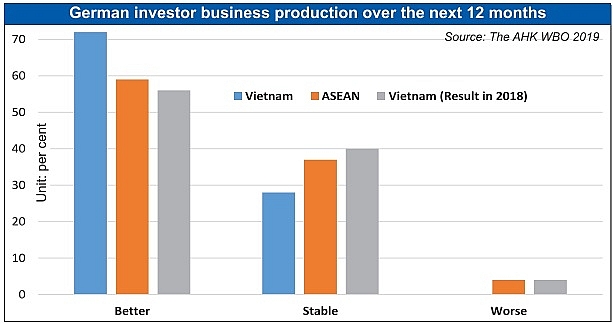Germans taking interest in Vietnam
 |
At last week’s meeting to announce the AHK World Business Outlook 2019 (AHK WBO), Marko Walde, chief representative of the German Industry and Commerce in Vietnam (AHK Vietnam), said that German businesses consider Vietnam as a focus of their investment plans.
“Vietnam is a target, as it is one of the four countries in the ASEAN that are members of the Comprehensive and Progressive Agreement for Trans-Pacific Partnership. Vietnam will also sign a bilateral free trade agreement with the EU,” said Walde. “In Vietnam, Germans do not focus on huge investment, but on long-term investment, bringing in state-of-the-art equipment, machines, and advanced technologies to the country.”
As shown in the AHK WBO, which studied over 3,500 German companies worldwide, German businesses operating in Vietnam assess both their current and future business situations significantly better than they did in 2018. Some 77 per cent rate their current business situation in Vietnam as good, up from 56 per cent in 2018, and higher than the ASEAN average of 61 per cent. The positive news does not stop there. From 2018 to 2019, the percentage of German business who rated their current business situation in Vietnam as negative fell from 4 per cent to zero.
What is more, 55 per cent of German companies in Vietnam intend to expand their activities within the country, while 59 per cent predict an increase in employment in 2019-2020.
“German investment in the country will increase in industry, construction, trade, and services, as well as in other economic sectors. German investment in Vietnam has tended to shift from basic projects into high-quality ones in line with Vietnam’s strategy to attract high-quality foreign direct investment,” the leader of AHK Vietnam told VIR.
The on-going US-China trade tensions have also impacted German investment in Vietnam, prompting companies to view investment in Vietnam as a safer, more reliable alternative to Chinese investments.
“German companies have tended to extend investments to a third country, including Vietnam, to ease risks in China. Hella is a typical example. As a leading developer and manufacturer of lighting technology and electronic products for the automobile industry, the company decided to establish a software centre in Ho Chi Minh City a few years ago, in addition to a similar centre in China,” explained Walde.
While the outlook for business in Vietnam has been increasingly positive, more than half of German companies (51 per cent) claim that economic policy framework is the greatest risk to their businesses in Vietnam. Some 28 per cent are worried about the potential for disadvantageous trade barriers, 44 per cent are concerned about a lack of qualified labour, and 31 per cent are worried about an increase in labour cost.
The concern regarding economic policy framework is increasing. Last year, 44 per cent of German business cited economic policy as the greatest factor of uncertainty for their business in Vietnam. In 2019, 51 per cent of German businesses share that concern. Despite these concerns, higher growth potential has increased German investment. According to statistics from the Ministry of Planning and Investment, as of May 20, German businesses invested in a total of 328 projects in Vietnam with the total investment capital of nearly $2 billion.
What the stars mean:
★ Poor ★ ★ Promising ★★★ Good ★★★★ Very good ★★★★★ Exceptional
Related Contents
Latest News
More News
- Hermes joins Long Thanh cargo terminal development (February 04, 2026 | 15:59)
- SCG enhances production and distribution in Vietnam (February 04, 2026 | 08:00)
- UNIVACCO strengthens Asia expansion with Vietnam facility (February 03, 2026 | 08:00)
- Cai Mep Ha Port project wins approval with $1.95bn investment (February 02, 2026 | 16:17)
- Repositioning Vietnam in Asia’s manufacturing race (February 02, 2026 | 16:00)
- Manufacturing growth remains solid in early 2026 (February 02, 2026 | 15:28)
- Navigating venture capital trends across the continent (February 02, 2026 | 14:00)
- Motivations to achieve high growth (February 02, 2026 | 11:00)
- Capacity and regulations among British areas of expertise in IFCs (February 02, 2026 | 09:09)
- Transition underway in German investment across Vietnam (February 02, 2026 | 08:00)

 Tag:
Tag:




















 Mobile Version
Mobile Version